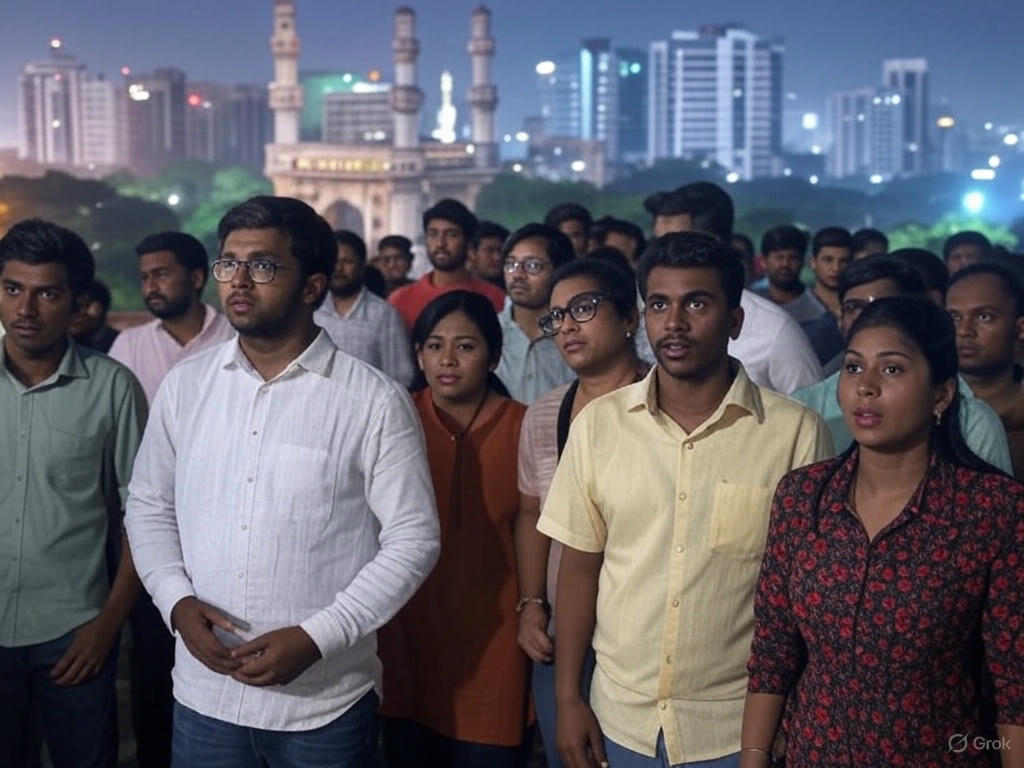Hyderabad Faces Escalating Social Tensions in 2025
Social Issues Social Inequalities and exclusionPosted by NewAdmin on 2025-04-18 09:08:05 |
Share: Facebook | Twitter | Whatsapp | Linkedin Visits: 88

Hyderabad, a city celebrated for its technological advancements and cultural heritage, is encountering a surge of social tensions in 2025 that are testing its social fabric. From rising crime rates and gender-based violence to disputes over land and water scarcity, these issues are prompting widespread concern among residents and authorities alike. As the city grapples with rapid urbanization, the need for effective solutions has never been more critical.
Crime has emerged as a pressing concern, with a recent spike in violent incidents across Hyderabad, Cyberabad, and Rachakonda commissionerates. Over the past week, police have struggled to contain a wave of murders, leaving the public alarmed and demanding enhanced security measures. This escalation has exposed gaps in law enforcement, with citizens questioning the effectiveness of current policing strategies. Concurrently, a disturbing case of gender-based violence unfolded when a 32-year-old man attacked his 22-year-old wife with cement bricks outside a Hyderabad hospital following a domestic dispute. The incident, which left the woman with severe injuries, underscores the persistent challenge of violence against women, despite legal protections in place.
Land disputes are fueling further unrest, particularly around the University of Hyderabad. Students and environmentalists have launched indefinite protests against the Telangana government’s claim to 400 acres in Kancha Gachibowli, alleging illegal deforestation and encroachment. The Supreme Court’s recent intervention, halting development work after taking suo motu cognizance, reflects the gravity of the situation. Activists argue that the loss of green cover threatens wildlife, as seen in the third spotted deer attack by stray dogs on the campus this year. This conflict highlights the tension between urban expansion and environmental preservation, with local communities caught in the crossfire.
Water scarcity is another mounting issue, exacerbated by the city’s growing population and shrinking water bodies. The Greater Hyderabad Municipal Corporation (GHMC) has faced criticism for inadequate water supply, with many areas reporting shortages despite the onset of pre-monsoon rains in April. Encroachment on lakes and wetlands, a byproduct of rapid development, has worsened the crisis, leaving residents dependent on private tankers at inflated prices. This situation disproportionately affects low-income neighborhoods, deepening social inequalities.
Adding to these challenges, the Waqf Amendment Act of 2025 has ignited protests across Hyderabad. On April 13, thousands gathered in Nampally, with AIMIM leader Asaduddin Owaisi labeling the legislation “discriminatory” and calling for its repeal. The demonstrations, one of the largest in recent memory, disrupted traffic and underscored communal sensitivities, raising questions about governance and inclusivity. The government’s response, including increased security deployments, has only heightened tensions.
Hyderabad’s social issues in 2025 reflect the complexities of balancing growth with equity. The city’s tech-driven economy contrasts sharply with these grassroots struggles, necessitating a coordinated approach involving community engagement, policy reform, and resource management. Residents are urging the government to address crime, protect vulnerable groups, preserve natural resources, and foster dialogue to mitigate communal divides. As Hyderabad navigates this turbulent period, its ability to adapt and heal will shape its legacy as a harmonious urban center.
Search
Categories
Recent News
- Telangana Tackles Addiction Crisis with IMH Expansion
- Gaddafi's Son Assassinated in Home Invasion
- Yes Bank Leadership Transition: RBI Appoints New MD & CEO
- WPL 2026: Delhi Capitals Secure a Thrilling Victory
- Arsenal's Wembley Dream Revived by Havertz's Heroics
- Trump's Signature Unlocks $1.2 Trillion: Government Reopens
- Malibu Mansion Controversy: Tongva Tribe Responds to Billie Eilish
- England's Rising Star Shines in Sri Lanka's Defeat